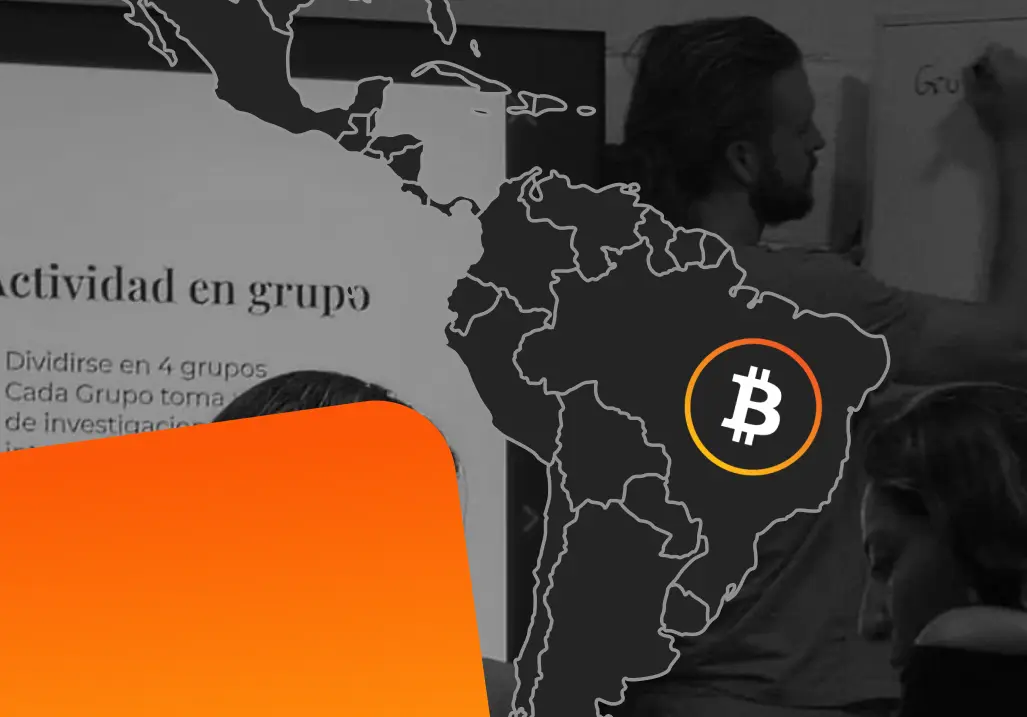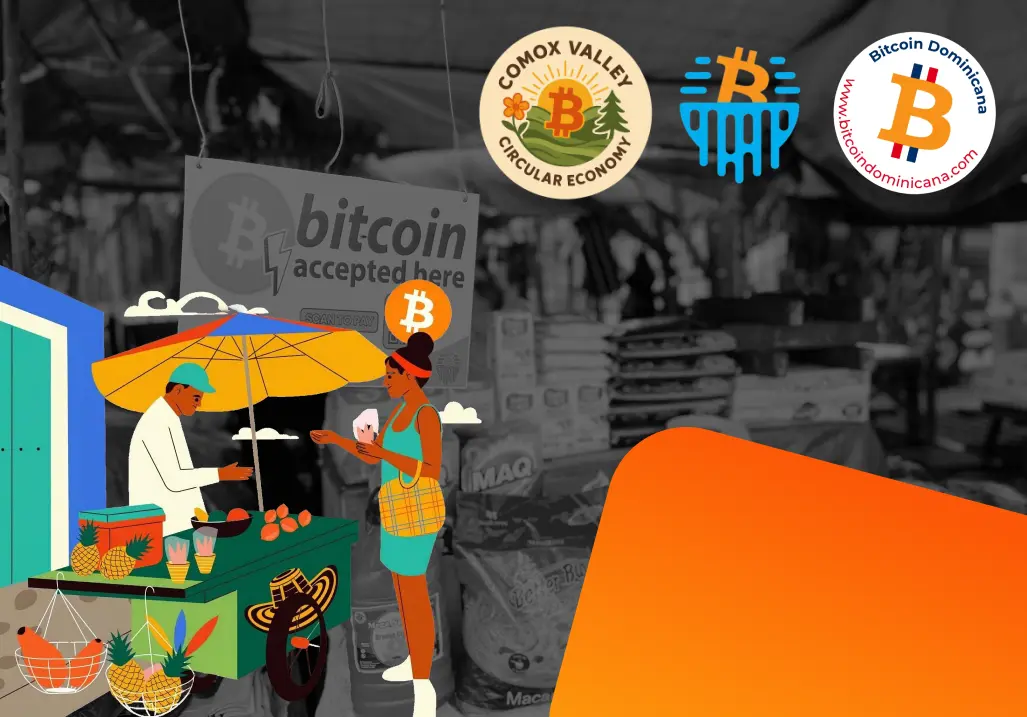In Blink’s Bitcoin adoption series, we’ve featured circular economies and real people's stories. Now, it’s time for Bitcoin businesses, a crucial part of the equation. For Bitcoin adoption to take place, the real people living in those circular economies need to exchange their sats for essential items and services. Without economic activity, the whole enterprise falls apart.
Among those Bitcoin businesses, there are two kinds of enterprises: software-based and brick-and-mortar. Each one has its own characteristics and different functions, but all are necessary for a robust ecosystem to emerge and Bitcoin adoption to succeed. For this article, we will focus on software-based businesses.
We’re putting a spotlight on Latin America because of 1.- Its vibrant Bitcoin scene, and 2.- Accessibility for the author. The selected companies for this particular piece are Brazil’s Spike to Spike, Argentina’s Roostock, and El Salvador’s Bitcoin Travel.
The Biggest Obstacle For A Bitcoin Business In Latin America
It varies from country to country, but in general, running a successful normal business in Latin America is challenging enough. Add the lack of Bitcoin education and low Bitcoin adoption on top of that, and a picture forms: the probability of succeeding for Bitcoin businesses in the region is low.
And yet, we try. And, hopefully, we thrive.
We asked Spike to Spike’s CEO, Carlos Gabriel, about the biggest obstacle his company faces and his answer was succinct: “bureaucracy.“
Roostock’s ambassador, José DryBit, offers another perspective; he thinks the primary challenge for a Bitcoin company in Latin America is “adoption and lack of education. There’s still a long road ahead. The reality is, few people use it. But still, you should accept it.” As an example, José DryBit pulls from his past. Before working with Roostock, he used to drive a taxi and accept Bitcoin payments. “When I drove the taxi to the airport, 98% of trips were paid in fiat. The remaining 2% saw it as a novelty and that encouraged them to pay in Bitcoin.”
For his part, Guillermo Antonio Figueroa, Bitcoin Travel’s CEO and founder, identifies several barriers in the company’s way. The first one relates to the education point already made: “many people still do not understand the practical use of Bitcoin beyond speculation.” The harsh reality is, Bitcoin is complicated, and understanding it requires hours and hours of study. Still, we have to persist. We have to teach.
Challenges For Bitcoin Adoption In The Region
Elaborating further, Bitcoin Travel’s CEO goes to the specifics: “banks or gateways do not understand the nature of Bitcoin businesses, making it difficult to connect with traditional services or access credit and financing.” The intersection between the Bitcoin network and banking is tricky all over the world, but that fact just emphasizes Figueroa’s point.
As if that’s not bad enough, add confusion and the word “crypto” to the mix. “The crypto ecosystem is often viewed with suspicion due to a lack of information or confusion between Bitcoin and other assets.” Even Google conflates Bitcoin with the rest of crypto. This is a bigger problem for Bitcoin adoption than most people realize.
Still, Bitcoin Travel’s CEO is optimistic about building in his homeland.
“Despite this, El Salvador offers the most favorable environment in the world for building this type of project. That is why we chose to develop our startup here, demonstrating that tourism can be the gateway to global Bitcoin adoption.”
On Bitcoin Adoption In El Salvador
On September 3rd, the Build In El Salvador newsletter interviewed Bitcoin Berlin’s Charlie Stevens, who’s also organizing the upcoming “Economía Bitcoin” conference. In an article titled “From Europe to El Salvador”, Mr. Stevens commented on his biggest challenges adapting to life in El Salvador.
“Without the established infrastructure, you have to handle many menial tasks just to create headspace for meaningful work. The constant influx and departure of people in this frontier environment means you're always adjusting and thinking about where your skills and energy are best directed.
It's not a place to come and retire comfortably. You need real purpose and the energy to build, because you won't find what you want - you have to build what you want to see.”
His perspective differs from local entrepreneur Guillermo Antonio Figueroa, but Stevens shares his optimism about building in El Salvador.
“Now the country is completely secure, capital is flowing in, and entrepreneurs from around the world are contributing ideas and energy. It's a hyper spot for starting businesses, whether serving local clients or global markets.”
Spike To Spike: Building A Bitcoin Business
Originally from Brazil, Spike to Spike is a P2P Bitcoin exchange. Besides the no KYC, its main characteristic is that “all SpikeToSpike participants are pre-selected.” They leave “a value in BTC locked on the platform as collateral for working with us. Therefore, if any SpikeToSpike assistant were to cheat, they would automatically be financially penalized in amounts much greater than the transactions.”
Another important characteristic of the service is that “all Bitcoins traded on SpikeToSpike are whitelisted, meaning they do not come from illegal activities and are completely legal.”
About his experience with Spike to Spike so far, its CEO, Carlos Gabriel, told Blink:
“It’s a struggle to get closer to bitcoiners around the globe because there are many scammers who try to use the good faith of many, so you have to create a very deep relationship to make a partnership. But once it is made, it’s an amazing journey.”
Working With Roostock for Bitcoin Adoption
Originally from Argentina, Roostock defines itself as “The Bitcoin DeFi layer.” For developers, their promise is: “Build apps secured by Bitcoin today with Rootstock. EVM compatible and supported by the leading developer tools; oracles, indexers, Rootstock is the most advanced and complete infrastructure for building on Bitcoin.”
It’s worth highlighting that Roostock runs its own federated blockchain and all activity occurs there, so, it doesn’t overload Bitcoin’s main chain.
As a Roostock ambassador, José DryBit told Blink that he has been learning how to “interact with the Roostock ecosystem. Everything has been evolving.” He told us about “Dollar On Chain or DOC, a stablecoin 100% collateralized in Bitcoin through Roostock smart contracts.” Another interesting project is “Tropykus, which offers loans in DOC for Bitcoin collateral.”
Will these projects contribute to advancing Bitcoin adoption? That’s the question.
Bitcoin Travel: The Road To Bitcoin Adoption
According to its CEO, Bitcoin Travel is “the world's first online travel agency that operates exclusively with Bitcoin payments.” The company is legally incorporated in El Salvador, “under the favorable laws and regulations of the state, which allows us to connect to the Bitcoin ecosystem and move away from the current financial system.”
Guillermo Antonio Figueroa considers Bitcoin Travel “a symbol of decentralized tourism.” Their slogan is: “It's not just a trip, it's a ray of freedom.”
Their conviction in Bitcoin is admirable, but the technology stack is the real innovation. “Our platform is fully developed with a search engine, backend, and administrative panel, a complete booking engine, and integrates via API with wholesale flight providers and more than 2.5 million hotels. Users can book flights, and soon hotels and activities, viewing prices in BTC/USD but paying exclusively in Bitcoin through Lightning Network technology.”
Conclusions: Latin America’s Business Ecosystem
The fact of the matter is: We’re so early. Worldwide Bitcoin adoption is just starting. The Bitcoin businesses of today are pioneers of the highest order. To succeed, they must educate their clientele in one of the most earth-shattering inventions in history. A complex system that requires both an open mind and hours of study to just begin to comprehend it.
And yet, they try. And, hopefully, they thrive.
Just as normal “be humble and stack sats” bitcoiners, these businesses are participating in an asymmetrical bet that could pay huge dividends. The road is uncertain and full of obstacles, but the possible prize is enormous. And we’re not only talking about economic gains here.
For each client these businesses orange pill, they are exponentially increasing the size and impact of the Bitcoin network. Be it Spike to Spike, Roostock, or Bitcoin Travel, they are all creating the conditions for Bitcoin adoption. And when hyperbitcoinization finally takes over the planet, they will all be in front of the line.


















